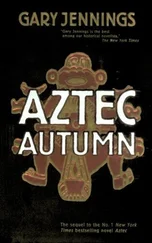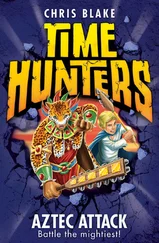Gary Jennings - Aztec
Здесь есть возможность читать онлайн «Gary Jennings - Aztec» весь текст электронной книги совершенно бесплатно (целиком полную версию без сокращений). В некоторых случаях можно слушать аудио, скачать через торрент в формате fb2 и присутствует краткое содержание. Жанр: Старинная литература, на английском языке. Описание произведения, (предисловие) а так же отзывы посетителей доступны на портале библиотеки ЛибКат.
- Название:Aztec
- Автор:
- Жанр:
- Год:неизвестен
- ISBN:нет данных
- Рейтинг книги:4 / 5. Голосов: 1
-
Избранное:Добавить в избранное
- Отзывы:
-
Ваша оценка:
- 80
- 1
- 2
- 3
- 4
- 5
Aztec: краткое содержание, описание и аннотация
Предлагаем к чтению аннотацию, описание, краткое содержание или предисловие (зависит от того, что написал сам автор книги «Aztec»). Если вы не нашли необходимую информацию о книге — напишите в комментариях, мы постараемся отыскать её.
"Anyone who reads, anyone who still lusts for adventure or that book you can't put down, will glory in Aztec."--Los Angeles Times
Aztec
Aztec
Aztec — читать онлайн бесплатно полную книгу (весь текст) целиком
Ниже представлен текст книги, разбитый по страницам. Система сохранения места последней прочитанной страницы, позволяет с удобством читать онлайн бесплатно книгу «Aztec», без необходимости каждый раз заново искать на чём Вы остановились. Поставьте закладку, и сможете в любой момент перейти на страницу, на которой закончили чтение.
Интервал:
Закладка:
In time, we resorted to catching rats and mice and lizards. Our children, those few who had survived the small pocks, got quite adept at snaring almost every bird foolhardy enough to perch on the island. Still later, we cut the flowers of our roof gardens and stripped the leaves from the trees and made cooked greens of them. Toward the end, we were searching those gardens for edible insects, and peeling the bark from the trees, and we were chewing rabbit-fur blankets and hide garments and the fawnskin pages of books for whatever meat value might be extracted from them. Some people, trying to trick their bellies into thinking they had been fed, filled them by eating the lime cement from the rubble of broken buildings.
The fish had not left our neighborhood for fear of being caught; they left because our surrounding waters had become so foul. Though the rainy season was by then upon us, the rains fell during only a part of each afternoon. We set out every pot and bowl to catch it, and hung out lengths of cloth to be drenched and wrung, but, for all our efforts, there was seldom more than a trickle of fresh rainwater for each parched mouth. So, after our initial revulsion, we got accustomed to drinking the lake's brackish water. However, since there was no longer any means of collecting and carrying away the island's wastes of garbage and human excrement, those substances got into the canals, thence into the lake. Also, since we would feed none but slaves to the menagerie beasts, we had no way of disposing of our other dead except to commit their bodies to that same lake. Cuautemoc ordered that the corpses be shoved off the island only on its western side, because the eastern lake was the wider water and was more or less constantly refreshed by the prevailing east wind, thus he hoped that the water on that side could be kept less contaminated. But the seeping sewage and decomposing bodies inevitably dirtied the water on every side of the island. Since we still had to drink it when thirst drove us to it, we strained it through cloths and then boiled it. Even so, it knotted our guts with agonies of gripes and fluxes. Of our older people and young children, many died just from drinking that putrid water.
One night, when he could no longer watch his people suffer so, Cuautemoc called all the city's populace to gather in The Heart of the One World during that night's lull in the cannonade, and I think everyone who could still walk was there. We stood about the pits in what had been the sleek marble paving of the plaza, surrounded by the jagged upcrops remaining of what had been the undulating Snake Wall, while the Revered Speaker addressed us from partway up what remained of the Great Pyramid's shattered staircase:
"If Tenochtítlan is to last even a little longer, it must be no longer a city but a fortification, and a fort must be manned by those who can fight. I am proud of the loyalty and endurance shown by all my people, but the time has come when I must regretfully ask an end to your allegiance. There still remains one storehouse unopened, but only one..."
The assembled crowd neither cheered nor clamored in demand. It merely murmured, but the combined sound was like the hungry rumbling of a very large stomach.
"When I unseal that store," Cuautemoc went on, "the maize will be shared out equally among all who apply. Now, it can provide every person in this city perhaps one last and very scant meal. Or it would suffice to feed our warriors slightly better, to strengthen them for fighting to the end, whenever that end shall come and whatever that end may be. I will not command you, my people. I will only ask that you make the choice and the decision."
The people made no sound at all.
He resumed, "I have this night had the northern causeway spanned so it can be crossed. The enemy waits warily on the other side, wondering why that has been done. I did it so that all of you who can depart, and will, may do so. I do not know what you will find yonder in Tepeyáca—food and relief or a Flowery Death. But I beg you who can no longer fight; take this opportunity to leave Tenochtítlan. It will be no desertion, no admission of defeat, and you will incur no shame in the departure. To the contrary, you will enable our city to stand in defiance a while longer. I say no more."
None went hurriedly or even willingly, all went in tears and grief, but they recognized the practicality of Cuautemoc's plea, and in that one night the city emptied of its old and its youngest people, its ill and crippled and infirm, its priests and temple attendants, all who could no longer be of use in combat. Carrying bundles or tumplined packs of what few most valued possessions they could snatch up as they left, they drifted northward through the streets of all four quarters of Tenochtítlan, began to converge in the area of the Tlaltelólco market, then formed a column crossing the causeway. They were met with no bursts of lightning and thunder at the northern end. As I learned later, the white men yonder were simply indifferent to their arrival, and the Texcalteca occupying that position deemed those stumbling, emaciated seekers of refuge too scrawny even to be worth sacrificing as a celebration of victory, and the people of Tepeyáca—though themselves captives of the occupying forces—made them welcome, with food and clean water and shelter.
In Tenochtítlan there remained Cuautemoc, the other lords of his court and his Speaking Council, the wives and families of the Revered Speaker and some other nobles, several physicians and surgeons, all the knights and warriors still fit—and some few stubborn old men, myself among them, who had been in good enough health before the siege that we had not been severely weakened by it, and could still fight if necessary. There also remained the young women of fair health and strength and potential usefulness—and one elderly woman who, for all my urgings, declined to leave the sickbed she had occupied for some while past.
"I am less of a nuisance lying here," said Béu, "than being carried on a litter by others who can barely walk. Also, it has been a long time since I cared to eat much, and I can as easily eat nothing at all. My staying may earn me an earlier end to my tediously long illness. Besides, Záa, you yourself once ignored an opportunity to go safely away. It might be foolish, you said, but you wished to see the end of things." She smiled weakly. "Now, after all your foolishnesses I have put up with, would you refuse to let me share the one that will likely be your last?"
Cortés rightly concluded, from the sudden evacuation of Tenochtítlan and the skeletal appearance of those who left, that the remaining inhabitants must also have weakened considerably. So, on the following day, he sent another frontal attack against the city, though he did not do it quite so impetuously as he had done before. The day began with the heaviest rain of projectiles that had yet fallen on us; he must have worked his cannons very near their melting point. No doubt he hoped the we would still be cowering under shelter long after the devastating rain stopped. But even then, when the shore cannons desisted, he kept his battle boats hovering about the northern end of the island, discharging a barrage into that half of the city, while his foot soldiers streamed across the southern causeway.
They found us not cowering. Indeed, what they did find made the front ranks of white men stop so suddenly that the following ranks rather untidily piled up behind them. For we had posted, at each place where the invaders could arrive upon the island, one of the fattest men among us—well, at least plump, compared to the rest of us—and the Spaniards found him simply strolling there, contentedly belching while he munched on a haunch of dog or rabbit or some such meat. If the soldiers had seen it close, the meat was in reality an awful green from having been so long hoarded just for that gesture of ostentation.
Читать дальшеИнтервал:
Закладка:
Похожие книги на «Aztec»
Представляем Вашему вниманию похожие книги на «Aztec» списком для выбора. Мы отобрали схожую по названию и смыслу литературу в надежде предоставить читателям больше вариантов отыскать новые, интересные, ещё непрочитанные произведения.
Обсуждение, отзывы о книге «Aztec» и просто собственные мнения читателей. Оставьте ваши комментарии, напишите, что Вы думаете о произведении, его смысле или главных героях. Укажите что конкретно понравилось, а что нет, и почему Вы так считаете.











